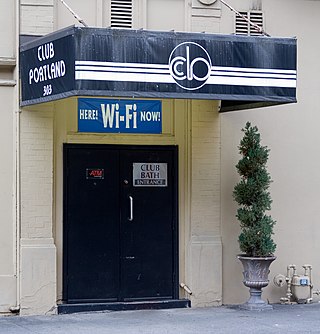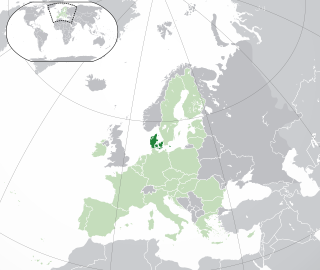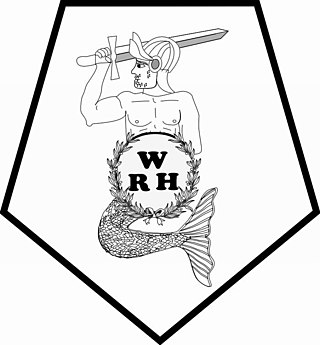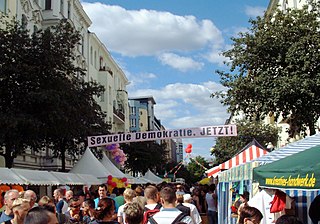
Shinjuku Ni-chōme (新宿二丁目), referred to colloquially as Ni-chōme or simply Nichō, is Area 2 in the Shinjuku District of the Shinjuku Special Ward of Tokyo, Japan. With Tokyo home to 13 million people, and Shinjuku known as the noisiest and most crowded of its 23 special wards, Ni-chōme further distinguishes itself as Tokyo's hub of gay subculture, housing the world's highest concentration of gay bars.

A gay bathhouse, also known as a gay sauna or a gay steambath, is a public bath targeted towards gay and bisexual men. In gay slang, a bathhouse may be called just "the baths", "the sauna", or "the tubs". Historically, they have been used for sexual activity.

A gay bar is a drinking establishment that caters to an exclusively or predominantly lesbian, gay, bisexual, transgender or queer (LGBTQ+) clientele; the term gay is used as a broadly inclusive concept for LGBTQ+ communities.
Outright Scotland is an LGBT rights organisation based in Edinburgh, Scotland. Founded as the Scottish Minorities Group in 1969, it was the country's first LGBT rights organisation.

Gay Liberation Front (GLF) was the name of several gay liberation groups, the first of which was formed in New York City in 1969, immediately after the Stonewall riots. Similar organizations also formed in the UK, Australia and Canada. The GLF provided a voice for the newly-out and newly radicalized gay community, and a meeting place for a number of activists who would go on to form other groups, such as the Gay Activists Alliance, Gay Youth New York, and Street Transvestite Action Revolutionaries (STAR) in the US. In the UK and Canada, activists also developed a platform for gay liberation and demonstrated for gay rights. Activists from both the US and UK groups would later go on to found or be active in groups including ACT UP, the Lesbian Avengers, Queer Nation, Sisters of Perpetual Indulgence, and Stonewall.

Lesbian, gay, bisexual, and transgender (LGBT) people in Belarus face significant challenges not experienced by non-LGBT residents. Although same-sex sexual activity is legal in Belarus, gay and lesbian rights in the country are otherwise severely limited and homosexuality remains highly stigmatized in Belarusian society. Households headed by same-sex couples are not eligible for the same legal protections available to opposite-sex couples. Belarus provides no anti-discrimination protections for LGBT people, nor does it prohibit hate crimes based on sexual orientation and gender identity. Many Belarusian people believe that homosexuality is a psychiatric illness, and many LGBT persons in Belarus tend to hide their sexual orientation in public. Those who are "out" face harassment, violence and physical abuse.

Pan Club Copenhagen was a gay club in central Copenhagen, Denmark which closed in 1994 after having been in operation on various locations in Copenhagen since 1970. However already in 1996 private owners opened a club at the former location with the same name and concept, successfully reviving the club until 2007.

Danish lesbian, gay, bisexual, and transgender (LGBT) rights are some of the most extensive in the world. In 2023, ILGA-Europe ranked Denmark as the third most LGBT-supportive country in Europe. Polls consistently show that same-sex marriage support is nearly universal amongst the Danish population.

LGBT+ Danmark – Landsforeningen for bøsser, lesbiske, biseksuelle og transpersoner is a social, cultural and political association for gays, lesbians, bisexuals and transgender people.
Lambda Warsaw Association is the oldest operating Polish LGBT organisation. It was founded in October 1997 by activists of Rainbow Centre, which existed from 1995 to 1997. As a public interest organisation, its aim is to create a positive gay and lesbian identity, and build social tolerance toward sexual minorities.
Minsk Pride is a gay pride parade in Minsk, Belarus. This is a festival in support of tolerance for gays, lesbians, bisexuals and transgender people in Belarus.
The Rainbow Round Table (RRT) of the American Library Association (ALA) is dedicated to supporting the information needs of LGBTQIA+ people, from professional library workers to the population at large. Founded in 1970, it is the nation's first gay, lesbian, bisexual, and transgender professional organization. While the current Rainbow moniker was adopted in 2019, the group has had various names during its 50-year history.

The Warsaw Homosexual Movement was an independent group of gays and lesbians which existed in Warsaw between January 1987 and summer 1988. The government of the Polish People's Republic refused the group's registration to become an NGO.

Paris, the capital of France, has an active LGBTQ community. In the 1990s, 46% of the country's gay men lived in the city. As of 2004, Paris had 140 LGBT bars, clubs, hotels, restaurants, shops, and other commercial businesses. Florence Tamagne, author of "Paris: 'Resting on its Laurels'?", wrote that there is a "Gaité parisienne"; she added that Paris "competes with Berlin for the title of LGBT capital of Europe, and ranks only second behind New York for the title of LGBT capital of the world." It has France's only gayborhoods that are officially organized.

Berlin was the capital city of the German Empire from 1871 to 1945, its eastern part the de facto capital of East Germany from 1949 to 1990, and has been the capital of the unified Federal Republic of Germany since June, 1991. The city has an active LGBTQ community with a long history. Berlin has many LGBTIQ+ friendly districts, though the borough of Schöneberg is widely viewed both locally and by visitors as Berlin's gayborhood. Particularly the boroughs North-West near Nollendorfplatz identifies as Berlin's "Regenbogenkiez", with a certain concentration of gay bars near and along Motzstraße and Fuggerstraße. Many of the decisive events of what has become known as Germany's second LGBT movement take place in the West Berlin boroughs of Charlottenburg, Schöneberg, and Kreuzberg beginning in 1971 with the formation of the Homosexuelle Aktion Westberlin (HAW). Whereas in East Berlin the district of Prenzlauer Berg became synonymous with the East Germany LGBT movement beginning in 1973 with the founding of the HIB. Schöneberg's gayborhood has a lot to offer for locals and tourists alike, and caters to, and is particularly popular with gay men.

The Homosexual Initiative Vienna (HOSI Wien) was founded in Vienna in 1979. It is Austria's oldest and largest gay, lesbian and bisexual association. It is a member-based organisation holding an annual general meeting and board elections. The organisation supports several sub groups including a youth group and women's group. It organises the annual Vienna Pride and Rainbow Parade.
French Quarter Cafe v. Virginia Alcoholic Beverage Control Board, 1:91-cv-01180 (1991) was a U.S. District Court for Eastern Virginia case in which the U.S. state of Virginia's longstanding ban on gay bars was declared unconstitutional.
Laura Frederikke Worsøe Nielsen is a Danish footballer who plays as a goalkeeper for Kolding IF in the Danish Women's League and the Denmark national team.












